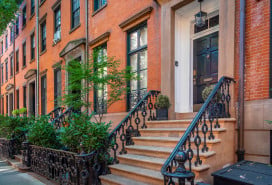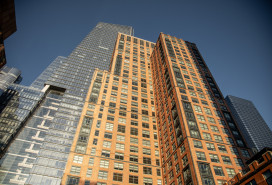10 telltale signs of a laid back—but not lax—co-op board

For better or worse, co-op boards are the ultimate NYC gatekeepers. They decide who to let in, and to keep out. But for those of us not blessed with a bottomless bank account that any co-op board would find peerless, or connections to pave away, the next best route may be to find a more relaxed building to try to enter in the first place. The benefits aren't just at the point of entry, of course. You want to live in a building that won't prescribe how you live in every single way. (And by relaxed, we also don't mean a co-op that will let the building fall apart.)
Below, 10 signs that suggest a building's board won't be breathing down your neck come application time and during your tenure there—but will be there when the need arises.
- All in the family. Everyone needs a little help getting their real estate bearings, especially when you're just starting out. Boards that let parents buy a starter co-op for their kids or sign on as guarantors are a definite good sign, since it means the building is looking for quality residents over loaded ones.
- Money in the bank. Speaking of finances, a relaxed board will still likely ask for at least 20 percent down. "The more fiscally conservative usually want 25-30 percent down," Aguayo notes, mostly so they can have a reserve in the bank for repairs and maintenance. (There are even co-ops out there that require 50 percent down, though many are loosening these policies in order to compete with condo buildings.) Be wary of the co-ops that request less than 20 percent, however, as you'll end up paying more money in the long run. And even a relatively laid back board will still want a fair amount of liquid assets available after closing, no matter how relaxed and easy-going they seem—generally at least a few months' worth of maintenance payments. "People lose their jobs, things change, so the board needs a cushion," Teplitsky says.
- A smart pet policy. “A great board is interested in maintaining a great quality of life,” Halstead broker Peggy Aguayo tells us. That could mean the board accepts pets, but wants to meet your Fido first to make sure he’s not prone to fits of yapping and yipping. But a pet-free co-op doesn’t necessarily indicate a stodgy board.
“If the community just doesn’t want pets, a good co-op board will implement that policy, whether they’re relaxed or not,” Carol Ott, the publisher and Editor-in-Chief of Habitat Magazine, tells us. - Roof access (within reason). Everyone wants to be able to take in the view and sip wine on their building's roof, though Aguayo notes that it’s never a free-for-all, since there are always rules and regulations for alcohol consumption and barbecuing. Additionally, some boards may ban rooftop access if the roof isn't structurally sound, which is less a sign that they're uptight than it is that they're responsible.
- A friendly vibe in the lobby. If you’re looking for a family-friendly board, Dean Roberts, a co-op at condo litigator at Norris McLaughlin & Marcus, suggests hanging out in the lobby for an hour or two as a fly on the wall.“See if the lobby is clean and well-staffed. Seeing who comes in and out of the lobby says a lot,” he adds. Do the tenants smile and interact with the doorman? Or are things strictly business?
- Second homes. Certain co-op boards can be picky about buying an apartment as a pied-a-terre, Aguayo says. And rightly so; it's a large financial burden and in the day and age of Airbnb, could be used as a hotel. While most buyers who don't plan to live in their place full-time take their search to the world of condos, if you are on the hunt for a co-op with a flexible pied-a-terre policy, keep in mind that many boards, even relatively chill ones, might ask for extra money in escrow just to be safe.
- Sublet matters. Having a co-op that's a little too liberal with subletting can spell trouble, as it could attract investors and those looking to get rich through Airbnb. "You don't want your co-op to turn into a hotel," Elliman broker Jacky Teplitsky says. That said, a good board will also be willing to hear you out over extenuating circumstances, and will have flexible policies to match. Even if you got a job in San Francisco but wanted to keep your place, board members should consider your case before shutting you down.
- Delivery, delivered. Strict and stuffy "white glove" co-ops (think: Park and Fifth Ave.) often make you come down to the lobby to retrieve your Seamless order. "They don't want strangers wandering around the building," Teplitsky explains. In contrast, easygoing co-ops usually let the delivery man do his job and bring your Pad Thai straight to your door, meaning more time to watch Netflix in your pajamas.
- Summer fixes. Many co-op boards have what they informally call "Summer Rules," the only time during the year when you can renovate your place (ostensibly, while everyone else is living it up in the Hamptons). Teplitsky says that's not necessarily a good thing. "Even during the summer, it's a limited work day, so your renovation might take three years!" she says. Best to look for a building that's flexible when it comes time to make capital improvements.
- Chatty residents. Unsurprisingly, the building's residents themselves are likely your best source for the real scoop on a building. Roberts recommends tracking down building residents or even little old ladies in the area who seem to know all the goings-on of the neighborhood. “They’re such a good source of Intel,” he says. “The rest is up to you.
As for signs a building might be too lax? The internet is also a good – but finite – place to research. Here, you can dig up Department of Buildings violations and other online reviews of the board. But keep in mind, one bad apple spoils the bunch. “You could have one cantankerous board member who says it’s Sodom and Gomorrah, “ Roberts jokes. “You shouldn’t just look for one thing, check all your sources and see what the trend is.”
Prospective buyers should come with a list of questions to make sure they’ve done all they can to test the waters. “I’d want to know if the board has future projects planned, not only because it may cost me money, but I want to know the board is looking to the future,” Ott says. As always, you'll want to have your attorney take a deep dive into the building's financials. Many co-ops in Queens have low rates, Ott says, but are in the red and can’t afford to make necessary repairs.
And aside from high turnover among the residents themselves, check to see how many managers the building has had. If it’s more than a few in the span of a decade, get out while you still can.
"I’ve had certain management companies be so lax,” Aguayo says. “They’re supposed to work for the board but they’re terrible.” That means these companies let leaks drip for days and chipped paint stay, well, chipped.
Related:
Ace your co-op board application: 14 successful real-life reference letters
The co-op board probably shouldn't interview your kids—but they very well may Facebook stalk them
Ask an Agent: do I need to get a home inspection before I buy a NYC apartment? (sponsored)
























